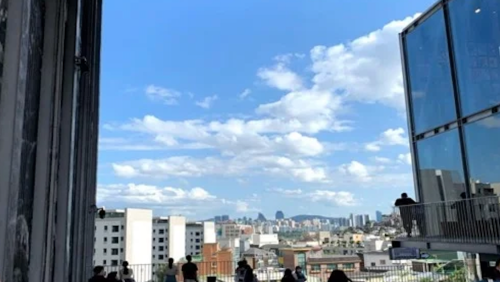Imagining a Greener Future for Post-COVID-19
October 25, 2020 by Hyunjin Kim

"Normal was a crisis." When we say we want to "go back to normal," do we really mean the world exactly as we left it? Or, could we use COVID as a means of building something better than what we had, perhaps greener?
It’s September in Seoul. The temperature is quite pleasant for the capital of South Korea, with summer sun lingering at limited times of the day with just the right amount of cool breeze. However, fall this year feels slightly more enjoyable than years past: perhaps because of the clear skies, unusual at this time. Last year in Seoul, people had to wear masks, even before COVID-19, due to years of accumulated air pollution from burning fossil fuels. But because of recent quarantine restrictions, Seoul residents have been able to enjoy clear, breathable air for the first time in a very long time.
This is not exclusive to Seoul. In fact, a recent study by the Organization for Economic Co-operation and Development (OECD)[1] shows that the short-term environmental impacts of the pandemic, both positive and negative, have been significant. Some of those are:
- Global CO2 emissions are expected to decline overall by 8% in 2020, to levels of 10 years ago.[2]
- Air pollution declined temporarily as industrial activity, ground transport, and air travel were heavily curtailed for several months. However, most countries have since reported a rapid return to rising levels of air pollution.[3]
- Water quality improved in a number of waterways and coastal zones, with a number of countries and regions reporting reduced concentrations of suspended particulate matter and other water pollutants.[4]
- Waste management challenges have increased significantly as a result of the pandemic. Governments must deal with major increases in medical waste (due mostly to disposable personal protective equipment), increased demand for single-use plastics (for groceries, food delivery, health care and e-commerce packaging), and reduced recycling capacity and a collapse of the market price for recycled plastics. Single use masks, which have been mandated by the government in many parts of the world, also are thrown away in massive amounts every day.[5]
Although short-term and marginal, it is still true that greenhouse gas emissions have decreased. Furthermore, there are efforts to keep this greener state going – many voices call for a “green recovery,” even when things return to normal.[6] Further, green stimulus measures are not only good for the environment, but when well-designed and implemented, they also can generate income, create jobs and improve well-being for all.[7] In fact, a review of the measures implemented in the aftermath of the 2008 global financial crisis proves such impact.[8]
According to preliminary analysis conducted by the OECD in August 2020, at least thirty OECD and partner countries have included measures directed at supporting the transition to greener economies as part of their recovery programs or strategies.[9] Such measures include:
- Grants, loans and tax relief directed towards green transport, circular economy and clean energy research, development and deployment;
- Financial support to households and businesses for energy efficiency improvements and renewable energy installations;
- New funding and programs to create jobs and stimulate economic activity through ecosystem restoration; and
- Control of invasive alien species and forest conservation.
One particular plan deserves notice. The European Green Deal is Europe’s new growth strategy that aims to transform the European Union into a resource-efficient and competitive economy where there are no net emissions of greenhouse gases by 2050 and economic growth is decoupled from resource use.[10] Targets of this deal include:
- Decarbonizing the energy sector through renewable energy projects, especially wind and solar, and kick-starting a clean hydrogen economy;
- Investing in environmentally-friendly technologies;
- Facilitating industry innovation in all sectors, especially energy;
- Rolling out cleaner, cheaper and healthier forms of private and public transport;
- Ensuring buildings are more energy efficient and supporting the circular economy; and
- Working with international partners to improve global environmental standards.
Enduring the economic, social, and health impacts of COVID-19 has been challenging, but if there are ways that we could leverage the pandemic, perhaps we can find a way to make the post COVID-19 world better than the one before.

Taken by author, Seoul on September 26, 2020.
[1] Anthony Cox, Making the Green Recovery Work for Jobs, Income and Growth, OECD (Sept. 14, 2020), http://www.oecd.org/coronavirus/policy-responses/making-the-green-recovery-work-for-jobs-income-and-growth-a505f3e7/#section-d1e692.
[2] IEA, Global Energy Review 2020, International Energy Agency (Apr. 2020), https://www.iea.org/reports/global-energy-review-2020#.
[3] Air pollution Returns to China, EEB (Apr. 21, 2020), https://eeb.org/air-pollution-returns-to-china/; Pollution de l’air à Paris: “On est revenue à 80% de niveau habituel,” Europe1, translated in Teller Report (June 10, 2020, 8:30 PM), https://www.tellerreport.com/news/2020-06-10-air-pollution-in-paris–%22we-have-returned-to-80%25-of-the-usual-level%22.S1EeOESR3U.html.
[4] Cox, supra note 2.
[5] Id.
[6] What is Green Recovery and Why Does It Matter?, Ben & Jerry’s Homemade Ice Cream, https://www.benjerry.co.uk/whats-new/2020/08/green-recovery-why-it-matter (last visited October 3, 2020).
[7] Cox, supra note 2.
[8] Shardul Agrawala, Damien Dussaux & Norbert Monti, What Policies for Greening the Crisis Response and Economic Recovery?, OECD (2020), https://www.oecd-ilibrary.org/environment/what-policies-for-greening-the-crisis-response-and-economic-recovery_c50f186f-en.
[9] Cox, supra note 2.
[10] A European Green Deal, European Commission, https://ec.europa.eu/info/strategy/priorities-2019-2024/european-green-deal_en (last visited Oct 3, 2020).

